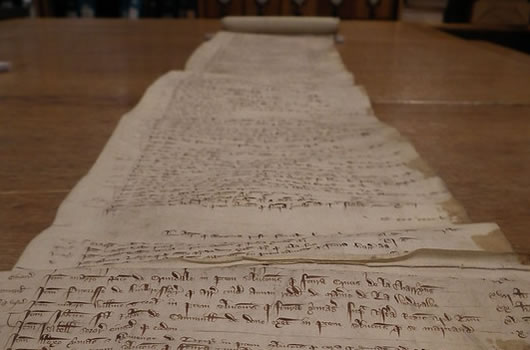Research: The Missing Evidence by Dr A.J. Hibbard
It is important to understand that very few government records survive that are capable of providing insight into the momentous period of the Protectorate in 1483. Taken together with the other missing records of King Richard’s reign, it looks very much as if a campaign was undertaken during the subsequent reign(s) to destroy any records that might have proven embarrassing to the new Tudor dynasty and their supporters. Here is a list as of July 2019. The list will be updated as needed.
- Local copies of the act we now call Titulus Regius, the King’s Title.
- Richard’s will (was there an Inquisition Post Mortem?).
- Richard’s Baga de Secretis is empty, yet we know there were treason trials during his reign (the records of which, if like other reigns, would have been kept there).
- The records on which Polydore Vergil based his account of events. (He has also been accused of having destroyed/burnt cartloads of documents himself).
- Warrants of the King’s Council: The Public Record Office (PRO) notes regarding the various categories of Chancery warrants for King Richard’s reign indicate that none survive.
- Central accounts for the Duchy of Lancaster.
- Nottingham records related to Richard’s reign, despite the fact that as king he spent the most time outside London there.
- No records of the Privy Council survive although some do for reigns before & after Richard.
- No records of the chapters held of the Order of the Garter for the 2 years of King Richard’s reign or for the first 2 years of Henry VII (precisely the time period in which some notice should have been taken of King Edward’s sons who were both members of the Order).
- Records of the Parliament of Ireland of 1487 that is said to have named Edward King of England were destroyed on the orders of Henry VII.
- Rhoda Edwards noted in the Introduction to her Itinerary a dearth of town records, which prevented any knowledge of the details of the King’s receptions on his Royal Progress. The only reason that we know so much about Richard’s relations with the City of York from their records is that Henry VII was unsuccessful in seeing his candidate installed on the City council; I have also wondered if his neglect of the City’s defences was payback for their lack of cooperation.
- The findings of the commissions to arrest and imprison all rebels following the October rebellion do not survive among the royal records.
- The Knole House records of Thomas Bourchier, Archbishop of Canterbury. All present and correct except for Richard's reign. John Morton followed Bourchier as Archbishop.
- John Morton’s nephew, Robert, was made Master of the Rolls after the battle of Bosworth, placing him in charge of the royal archive and all legal documents. Morton had been removed from this position in September 1483 following his uncle’s rebellion against Richard.
- Given this situation, those who have written about King Richard have, for the most part, relied on sources that were written after King Richard’s death, by writers who had no first hand understanding of events or of the context of the events they passed on. This is why those who wish to study Richard III must use whatever contemporary source materials survive from his own lifetime, and why The Missing Princes Project is actively searching for new materials from the king’s life and reign.
Source: Hibbard, A.J. (2019) 'The Missing Evidence' in Pendlington, S. (Ed.) The Court Journal, Vol. 26, Autumn 2019. Published by the Scottish Branch of the Richard III Society: Annan, Dumfriesshire
Editor’s Comment: My thanks to AJ for her research. It shows us precisely what the situation is – that it seems there was, sadly, a very deliberate campaign to destroy records.
Dr Hibbard will update the list as her work continues.
Dr A J Hibbard is a retired professor from the University of Wisconsin specialising in transfusion medicine. She has considerable academic experience involving the evaluation of evidence and was introduced to historical research through her 20 year search to identify her late Grandfather. AJ has been researching the life and times of Richard III intensively since the announcement of the identification of King Richard’s remains in 2013 and has been a member of the Richard III Society since then. Her interest in King Richard began following the broadcast of An Age of Kings in the US in about 1962, followed directly by reading Paul Murray Kendall’s acclaimed biography. AJ is an American national.

